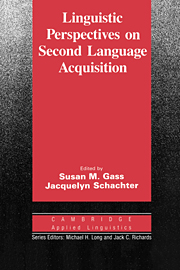Book contents
- Frontmatter
- Contents
- List of contributors
- Series editors' preface
- Introduction
- I THEORIES OF ACQUISITION
- II SYNTAX
- III SEMANTICS/PRAGMATICS
- IV LEXICON
- V PHONOLOGY
- Chapter 11 A constructivist perspective on non-native phonology
- Chapter 12 Stress assignment in interlanguage phonology: an analysis of the stress system of Spanish speakers learning English
- Index
Chapter 12 - Stress assignment in interlanguage phonology: an analysis of the stress system of Spanish speakers learning English
Published online by Cambridge University Press: 05 October 2012
- Frontmatter
- Contents
- List of contributors
- Series editors' preface
- Introduction
- I THEORIES OF ACQUISITION
- II SYNTAX
- III SEMANTICS/PRAGMATICS
- IV LEXICON
- V PHONOLOGY
- Chapter 11 A constructivist perspective on non-native phonology
- Chapter 12 Stress assignment in interlanguage phonology: an analysis of the stress system of Spanish speakers learning English
- Index
Summary
The primary objective of this study is to conduct an analysis of the stress patterns found in the interlanguage of native speakers of Spanish learning English as a second language. These stress patterns are largely identical to those of native speakers of English, but they include a body of systematic errors. Using the theoretical framework of metrical phonology, an attempt will be made to formulate a set of rules to account for the system of stress assignment of these language learners, based on other components of the learners' linguistic knowledge and experience. The stress system of Spanish will be considered as a possible source for interlanguage rules, as will the learners' acquired knowledge of the target language system and universal tendencies of stress assignment.
The results of this analysis will be used to provide tentative answers to broader questions in the field of second language acquisition, questions concerning the role of transfer in the acquisition of phonology in general and in the acquisition of stress in particular.
Description of methods and data
The empirical data for this research was gathered in interviews with 23 native speakers of Spanish studying English in the United States. Seven of these informants were interviewed twice, yielding a total of 30 interviews. During the interviews, informants were engaged in casual conversation and then asked to read sentences, paragraphs, and short stories containing “test words” that had been selected to provide data about Spanish speakers' stress assignment in English.
- Type
- Chapter
- Information
- Linguistic Perspectives on Second Language Acquisition , pp. 260 - 284Publisher: Cambridge University PressPrint publication year: 1989
- 16
- Cited by



